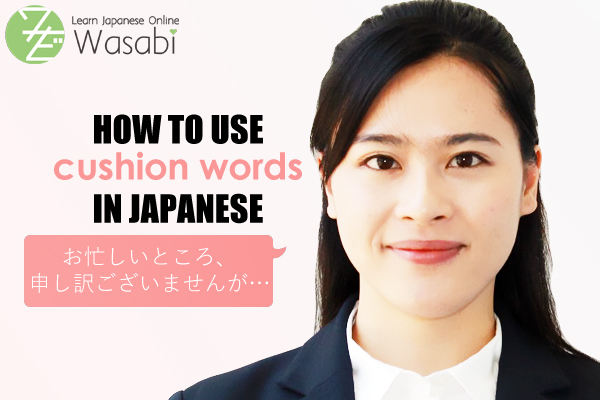How to Use Cushion Words in Japanese
Welcome back to our next “Video & Article” series with tutor Miki. In this article and video we will take a look at a couple of so called “cushion words” that you can use to make your polite Japanese sound softer and friendlier. Cushion words are essential for natural Japanese, so let’s see how you can integrate them into your speech!
| Table of Contents [Introduction] [お手数ですが] [お忙しい所、申し訳ございません] [失礼ですが] [確かにその通りですが] [ご期待に添えず大変申し訳ございませんが] [あいにくですが] |
[Introduction]
In today’s lesson we are going to talk about and learn some “cushion words”. Cushion words are incredibly useful because they add extra verbal padding to potentially touchy topics.
With cushion words you can not only get your message across in a polite way, but also add a layer of softness and friendliness, increasing your courteousness. Cushion words are very useful when you want to politely decline an offer, when you want to request something, or softly show your disagreement without sounding offensive.
[adsense]
[お手数ですが]
Let’s begin! The first cushion word we’ll take a look at today is “お手数ですが”.
お手数ですが…
Sorry for the inconvenience, but…
“お手数ですが” is an expression that similar to the English “sorry for the inconvenience” acknowledges ahead of whatever follows that you will be causing the other person some trouble, apologizing even before your actual request.
Let’s look at a situation where you can use “お手数ですが” to request something:
If you want someone to check or confirm something (“ご確認ください”), you can preemptively apologize by adding “お手数ですが” right before your request:
お手数ですが、ご確認ください。
I’m sorry for the inconvenience, but please confirm this.
“お手数ですが” makes the sentence politer and softer.
[お忙しい所、申し訳ございません]
Another cushion word that can be used when making requests is “お忙しい所、申し訳ございません”.
お忙しい所、申し訳ございません
I’m sorry to bother you when you are busy
The literal translation of “申し訳ございません” is “I have no excuse to say anything”, conveying that you are so sorry you feel there is no excuse for what you have done. Despite this sounding very dramatic, this phrase is commonly used as a polite/humble form for “I’m sorry” and no one really thinks deeply about the literal meaning.
Let’s see how this is used in conversation.
In this scenario, someone wants to talk to their co-worker who is in the middle of doing something. Instead of saying what she wants directly, she says:
お忙しい所申し訳ございません、こちらにサインしていただけますか?
I’m sorry to bother you when you’re busy, but could you sign right here?
What she is doing here is that she is letting the co-worker know about her awareness of the consequences of her action. The co-worker might not feel good to be interrupted, but she implies that there is nothing she can do to apologize for her action and that she is aware of his or her busy circumstances, hopefully making them feel less upset about being interrupted.
[失礼ですが]
The third cushion word we are introducing today is “失礼ですが”. This expression also has an apologetic feeling to it, but it also implies that you are aware you are about to ask something rude. This may sound a little off, since if you know that the question is going to be rude, why ask in the first place?
This is connected to the Japanese cultural concept of “心遣い” or “気遣い”, which means to be considerate and aware of the other person’s circumstances. The last thing Japanese people want is to offend someone.
However, sometimes at work you might encounter a situation where you have to ask questions they may come across as rude or personal. In that case, you can give the person a heads up and apologise in advance with “失礼ですが”.
For example, imagine yourself at city hall filling out some important documents. The clerk has to confirm your marital status. He might ask you like this:
失礼ですが、ご結婚はされていますか?
I’m sorry, but are you married?
Asking personal questions like someone’s marital status may be considered impolite by some people in Japan. Using cushion words will help you make sure you do not accidentally offend someone.
You can use “失礼ですが” anytime you ask someone a somewhat personal question. Next time you ask someone for their name, you could say:
失礼ですが、お名前は何ですか
?
Excuse me, but what is your name?
They will probably be impressed by your politeness and consideration!
[確かにその通りですが]
“確かにその通りですが” can be literally translated to English. It means “This is true, but…”. For example:
確かにその通りですが~のため、出来ません。
Yes, you are right, but because of ~, we cannot do it.
In both Japanese and English, placing this phrase in front of a refusal will hopefully make the listener feel they are being heard, which usually plays an important role in resolving conflicts.
[ご期待に添えず大変申し訳ございませんが]
The next phrase we’ll look at is a bit longer: “ ご期待に添えず大変申し訳ございませんが”. This means “I’m terribly sorry to be unable to give you a reply that meets your expectations, but…” – in other words, it is a very wordy way to decline or refuse something or disappoint someone.
For example:
A: すみません。これ、安く出来ますか?
A: Excuse me, is this product discountable?
B: ご期待に沿えず大変申し訳ございませんが、それはできません。
B: I’m terribly sorry that I could not give you a reply that fulfills your expectations, but we cannot offer a discount on this item.
The last cushion expression we will look at today is “あいにくですが”, which directly translates into “Unfortunately…” in English.
Let’s take a look at an example conversation:
プルルルル…(電話の着信音)
(The phone rings)
A: はい、株式会社ABCです。
A: Hi this is ABC company. How can I help you?
B: ケリーと申しますがヤマダさんはいらっしゃいますか?
B: This is Kerry, may I speak to Mr. Yamada?
A: あいにくですが、彼は会議中です。
A: Unfortunately he is in a meeting right now.
That is all for today’s lesson. If you have any questions you can always clear them up by booking a lesson with one of our native Japanese tutors. See you next time!
| クッション言葉 | Expressions to soften awkward situations, declining and asking for something |
| 丁寧 | Polite |
| 優しい | Kind, gentle |
| 印象 | Impression |
| 与える | To give, to bestow |
| 頼む | To request, to ask for, to order |
| 断る | To refuse, to reject, to decline |
| 反対意見 | Dissenting opinion |
| お手数ですが | Sorry for the inconvenience, but… |
| お忙しいところ、申し訳ございません | Sorry to disturb you while you’re busy |
| 失礼ですが | I apologise (for being impolite), but… |
| 確かにその通りですが | This is true, but… |
| ご期待に添えず大変申し訳ございませんが | I apologise for being unable to meet your expectations, but… |
| あいにく | Unfortunately |
| 会議 | Meeting |

Learn 9 Idioms Using the Word “あたま” in Japanese

Eight funny & figurative idioms you need to know in Japanese



